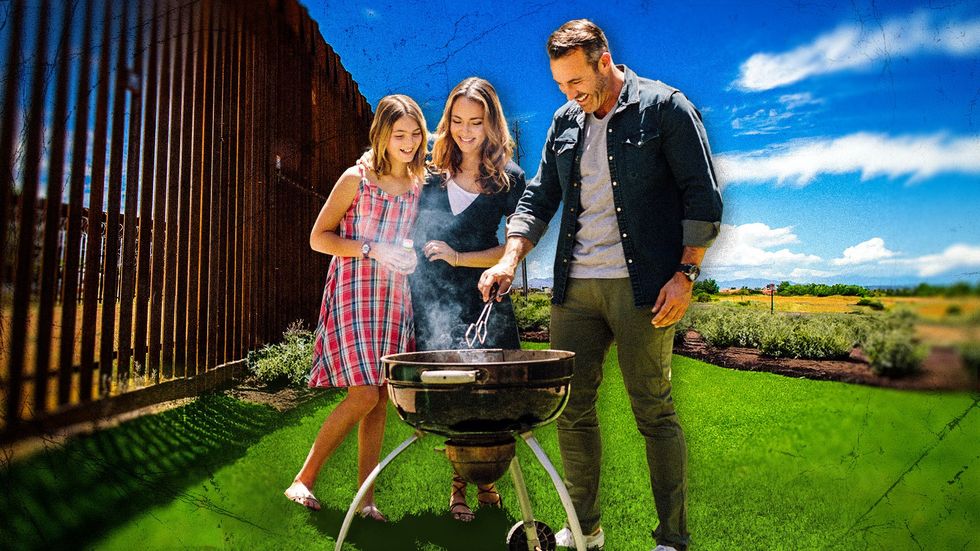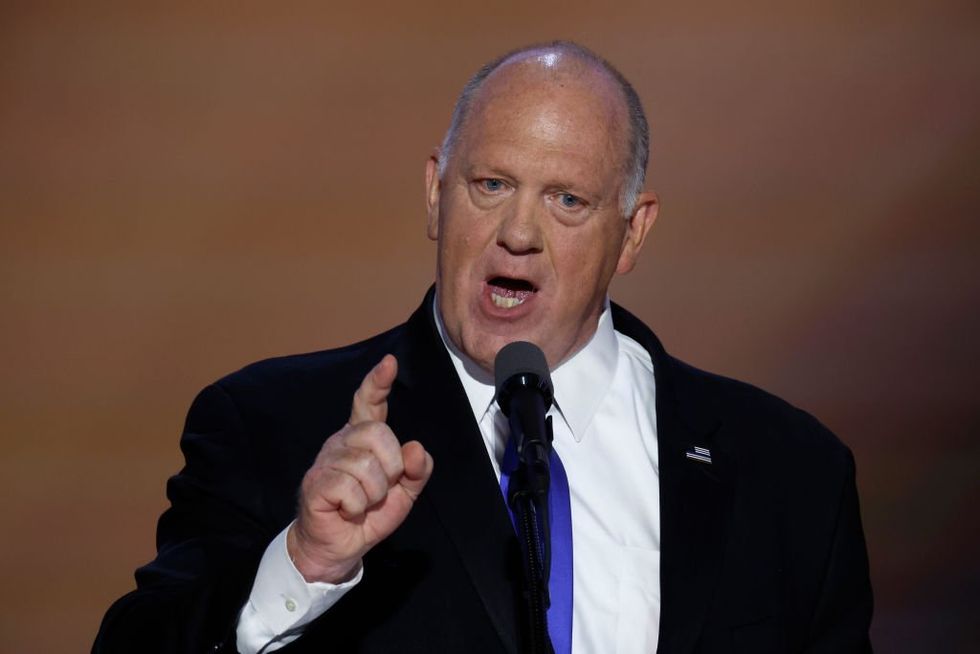The easiest argument against mass migration: ‘Because we live here’
In the age of the internet, the viral clip is king, and no one in politics churns out viral clips quite like Donald Trump. During his debate with Vice President Kamala Harris, Trump acknowledged the plight of Springfield, Ohio, where the local population is dealing with a massive influx of Haitian immigrants brought in by the Biden-Harris administration. Trump’s assertion that “they’re eating the dogs, they’re eating the cats,” became the breakout clip of the debate, quickly creating a viral TikTok trend and even inspiring a hit dance song. The media attempted to “fact-check” and censor the claim, but the Streisand effect took hold. Dozens of conservative and independent journalists began investigating the town and interviewing its residents. The nation soon learned that not only was the situation in Springfield out of control, but it was just one of many cities across the country facing the threat of replacement-level immigration. The right to associate, to form communities with others and maintain the character and way of life in those communities, is the most basic of natural laws. Once it became clear that replacement-level immigration was happening, the media moved to the next stage of gaslighting: Well, of course it’s happening, and it’s a good thing. The discussion shifted from questioning whether the government was coordinating the mass migration of foreign populations into Midwestern towns to debating whether this massive displacement was somehow beneficial. Liberals quickly adopted neoconservative rhetoric, relying on the idea that raw economic activity is the sole determining factor of communal well-being. They argued that immigrants were “revitalizing” the economies of these small, forgotten towns, and that was all that mattered. The claims of economic revitalization are incredibly dubious. Most of the Haitian “refugees” are living on heavy federal subsidies that cover everything from housing to health care. Yes, more money is technically being spent in those neighborhoods, but the funds come from unsustainable, inorganic sources and are driving up the cost of living for the native population. Working-class families are being priced out of the housing market as federally subsidized immigrants raise rents. Crime and automotive accidents have skyrocketed, while parents pull their children out of local schools overwhelmed with non-English-speaking students. None of this matters to ideologues justifying replacement migration. If an arbitrary economic chart shows the line going up, the entire project is a success. No one explains why the economy can't be revitalized by handing the same money to the town's existing population. Somehow, only massive immigrant populations are credited with possessing this magic. Amid this debate over economic benefits, the people of towns like Springfield are suddenly asked to justify their desire to maintain the character of their communities. Both sides of the immigration debate trade abstract statistics about economic development or crime, but it’s the people whose families have lived in these communities for generations who are witnessing the real impact. Tiresome and lazy accusations of racism are the default slander against these communities, even though black residents have been some of the most vocal in pushing back against mass migration. Scornful politicians and journalists demand that these victims of cynical political maneuvers present a rational, statistically objective case for protecting their communities. But they should be able to make the most basic moral argument of all: Because we live here. The right to associate, to form communities with others and maintain the character and way of life in those communities, is the most basic of natural laws. The idea that what a community builds is the rightful inheritance of its posterity, and that cultural continuity from one generation to the next is worth preserving, forms the foundation of civilization. This principle was enshrined in the U.S. Constitution, but it was taken for granted. In any previous era, the notion that people would need an abstract academic argument to justify preferring their own community and prioritizing its welfare over that of strangers would have been seen as absurd. A radical shift in epistemology now serves as a convenient tool to smuggle in dogmatic assumptions. The idea that expert opinion and data are the only valid sources of truth in any public debate allows the institutions producing those experts and generating that data to define the parameters of every discussion. The most ancient appeals suddenly become invalid in the face of expert institutions and statistics. What if a community is more than just a zone of economic activity? What if there are critical factors, like social cohesion, that don't immediately show up in data but are vital to defining human well-being? These questions are never answered because they aren't easily addressed by our new


In the age of the internet, the viral clip is king, and no one in politics churns out viral clips quite like Donald Trump. During his debate with Vice President Kamala Harris, Trump acknowledged the plight of Springfield, Ohio, where the local population is dealing with a massive influx of Haitian immigrants brought in by the Biden-Harris administration. Trump’s assertion that “they’re eating the dogs, they’re eating the cats,” became the breakout clip of the debate, quickly creating a viral TikTok trend and even inspiring a hit dance song.
The media attempted to “fact-check” and censor the claim, but the Streisand effect took hold. Dozens of conservative and independent journalists began investigating the town and interviewing its residents. The nation soon learned that not only was the situation in Springfield out of control, but it was just one of many cities across the country facing the threat of replacement-level immigration.
The right to associate, to form communities with others and maintain the character and way of life in those communities, is the most basic of natural laws.
Once it became clear that replacement-level immigration was happening, the media moved to the next stage of gaslighting: Well, of course it’s happening, and it’s a good thing. The discussion shifted from questioning whether the government was coordinating the mass migration of foreign populations into Midwestern towns to debating whether this massive displacement was somehow beneficial.
Liberals quickly adopted neoconservative rhetoric, relying on the idea that raw economic activity is the sole determining factor of communal well-being. They argued that immigrants were “revitalizing” the economies of these small, forgotten towns, and that was all that mattered.
The claims of economic revitalization are incredibly dubious. Most of the Haitian “refugees” are living on heavy federal subsidies that cover everything from housing to health care. Yes, more money is technically being spent in those neighborhoods, but the funds come from unsustainable, inorganic sources and are driving up the cost of living for the native population. Working-class families are being priced out of the housing market as federally subsidized immigrants raise rents. Crime and automotive accidents have skyrocketed, while parents pull their children out of local schools overwhelmed with non-English-speaking students.
None of this matters to ideologues justifying replacement migration. If an arbitrary economic chart shows the line going up, the entire project is a success. No one explains why the economy can't be revitalized by handing the same money to the town's existing population. Somehow, only massive immigrant populations are credited with possessing this magic.
Amid this debate over economic benefits, the people of towns like Springfield are suddenly asked to justify their desire to maintain the character of their communities. Both sides of the immigration debate trade abstract statistics about economic development or crime, but it’s the people whose families have lived in these communities for generations who are witnessing the real impact.
Tiresome and lazy accusations of racism are the default slander against these communities, even though black residents have been some of the most vocal in pushing back against mass migration. Scornful politicians and journalists demand that these victims of cynical political maneuvers present a rational, statistically objective case for protecting their communities. But they should be able to make the most basic moral argument of all: Because we live here.
The right to associate, to form communities with others and maintain the character and way of life in those communities, is the most basic of natural laws. The idea that what a community builds is the rightful inheritance of its posterity, and that cultural continuity from one generation to the next is worth preserving, forms the foundation of civilization. This principle was enshrined in the U.S. Constitution, but it was taken for granted. In any previous era, the notion that people would need an abstract academic argument to justify preferring their own community and prioritizing its welfare over that of strangers would have been seen as absurd.
A radical shift in epistemology now serves as a convenient tool to smuggle in dogmatic assumptions. The idea that expert opinion and data are the only valid sources of truth in any public debate allows the institutions producing those experts and generating that data to define the parameters of every discussion. The most ancient appeals suddenly become invalid in the face of expert institutions and statistics.
What if a community is more than just a zone of economic activity? What if there are critical factors, like social cohesion, that don't immediately show up in data but are vital to defining human well-being? These questions are never answered because they aren't easily addressed by our new sources of authority. They would challenge the very foundation of that authority.
Of course, our ruling class considers some communities more valuable or valid than others. Recently, the Chicago City Council approved $51 million to house a large population of illegal immigrants for a 30-day period. During the council meeting, the police removed several outraged residents who demanded to know why that enormous amount of money wasn’t being spent to improve the lives of their community members instead. The community in question is predominantly black, which will spare it from the ire of the media and the disdain of the Democratic Party, even though the argument is the same one being made in forgotten Midwestern towns: because we live here and have the right to prefer our community.
Economic data can be valuable, and crime statistics are important, but none of these metrics matter if we don’t first understand the community they represent. American towns and cities should not be treated as sandboxes where the ruling elite can run social experiments until they produce the kinds of subjects they favor.
It is enough for the people of the United States to prefer their neighbors and the way of life they have built in their communities. It is reasonable to expect a degree of ownership over what your ancestors built. It is also acceptable to love something and defend it because it is yours, without needing abstract data or the validation of experts. It is both moral and just to protect our communities from replacement migration “because we live here,” and we must never be shamed into believing otherwise.
Originally Published at Daily Wire, World Net Daily, or The Blaze
What's Your Reaction?
































































































